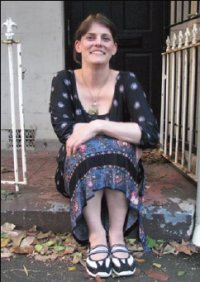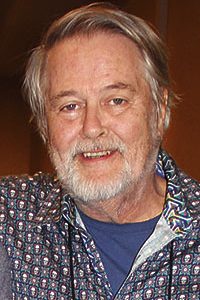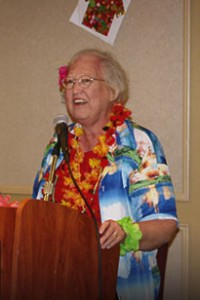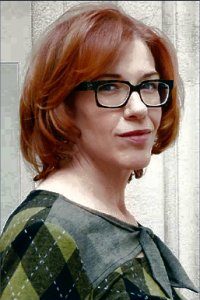Spotlight on Deborah Biancotti, Author
Deborah Biancotti lives and writes in Sydney, Australia. She’s been shortlisted for a Shirley Jackson Award for her first novella, and her first short story collection was shortlisted for the William L. Crawford Award for Best First Fantasy Book. She’s also won Aurealis and Ditmar awards for her short story writing. Both her collections, A Book of Endings and Bad Power, are available from Twelfth Planet Press. Deborah is currently working on a novel series and has a new story coming out in Exotic Gothic 5. She’s available mostly in the Twitterverse (as deborah_b) and via her website at http://deborahbiancotti.net.
I have about one and a half books in a contemporary science fiction series that I’ve spent the past year on, and I am having a ball. I guess it’s a kind of a corporate paranoia tale. Is that a thing? I think it’s a thing. There should be more of this thing, I think.
I don’t know when I realized that the story I was telling was longer than one book, but at some point I realized I didn’t want to stop hanging out with this character I’d built. I love how she throws herself into things and then barely stumbles out the other side.
Yeah. Turns out, novel writing is a blast. Or maybe I just got lucky on this one, ’cos my previous attempt at writing novels wasn’t this much fun.
You write a lot about Sydney – what makes the city appealing as a setting?
Well, not to sound lazy, but it’s the city I live in. So that’s appealing. But Sydney fascinates me more the more I find out about it. It’s Australia’s oldest post-colonial city, but by world standards it’s still quite young. Sometimes it reminds me of ancient European cities, like Rome and Naples and Madrid, say. All traffic chaos and corners where detritus is busily building into its own shapes. Sometimes, instead, what you notice is its alcoves of villages, like Chippendale and Erskinville (Chippo and Erko, to those in the know). The village thing is a little like New York, where you can be in a perfectly large metropolis one minute and then suddenly find yourself strolling along a quiet street towards the most perfect local bar you’ve ever come across.
And then sometimes – perhaps more obviously – it’s reminiscent of coastal cities like Vancouver, San Francisco and Boston, where the water has as much of a presence as the land.
I think there’s something haphazard about Sydney; something tragically awkward about a city perched on the edge of a stolen land. Corporate buildings with shiny steel girders and deep blue windows clash with the pastels and beige of the eighties boom. Local pubs and cafes are dug into the red brick and peeling paint of the falling-down Art Deco buildings.
You contributed to the Ishtar anthology, which also had stories by Kaaron Warren and Cat Sparks. What can you tell us about the project?
Ishtar was one of those dream projects. Mark Deniz of Gilgamesh & Morrigan Presses came up with the idea of a three-novella anthology around the subject of Ishtar. He then approached us to write the historical, contemporary and futuristic stories. I was thrilled to get the contemporary story (I think I might’ve made a pitch for that one), although it was daunting to be in the potential position of the ‘‘sagging middle.’’ It was probably that worry that motivated me to write a thriller-style story told in present tense. And wow, writing in present tense is an incredibly energizing experience. I strongly recommend it.
Kaaron generously shared her research, and after a couple of initial discussions, we pretty much made our own ways through our stories. I think it’s part of the magic of the project that the resulting anthology hangs together so well; I mean, apart from the effort and teamwork, of course. The collection and stories were nominated for a few awards locally and my novella was shortlisted for a Shirley Jackson Award.
You’ve described yourself as a ‘‘tired idealist.’’ Care to elaborate?
Alfred Adler said it’s easier to fight for your principles than it is to live up to them. I think for a long time I took that as a personal challenge. I wanted to walk the walk. So I tried to live a life of justice and intelligence and grace. I guess you could say I was an angry youth for a long time, long after I could manage to call myself a youth at all.
But if you’re lucky enough to get older, you begin to realise that a lot of the ideals that drive you really are very hard to hold onto in the real world. In the space of one year a while ago, I had two people I worked with basically tell me to a) be less honest and b) care less about the quality of what I was doing. And not even in a very round-about way, but to actually say, ‘‘Your problem is, you’re too honest.’’ I hadn’t even realized I had a problem until then.
The worst bit was, I realized they were right, that the ideals fiction had fed me – of justice and equality, say, or the ‘‘rightness’’ of reward and loss – were a waste of time for the real world. I began to wonder why we weren’t teaching ‘‘real life’’ skills to kids in school. Like, ‘‘how to deal with bullies,’’ ‘‘how to suck up to your loser boss,’’ ‘‘why being a jerk gets you the desk with the view,’’ ‘‘how to not be bothered when the bad guys win.’’ I mean, it really obsessed me for a while.
I figured if I was going to survive, I either had to a) get rid of my juvenile ideals, or b) hold onto them & become sidelined. And you know what? I chose the latter even though I thought it was the dumb choice. I know I’m supposed to say that it made me a better person or a stronger person or there was some intrinsic pay-off for holding onto the ideals which defined me. But actually I don’t think it is the ideals that define me. It’s my dumb decision to stick to them that most shows what I am.
An idiot. Too old to learn to be somebody new.
You’re often described as a horror writer. Do you write to the horror audience, specifically?
I don’t. But I think if you write honestly, a lot of what you say will look like horror. That is to say, there is a dark and difficult side to life, and sometimes we write about it in order to exorcise it, and sometimes we write about it to embrace it, to remind ourselves about what it is to be human. Which is, messy and complicated and corrupted and aspirational and sometimes hopeful, sometimes hopeless.
I think it’s the acknowledgement of that darkness which makes people who write horror amongst the most welcoming and down-to-earth people to work with.







